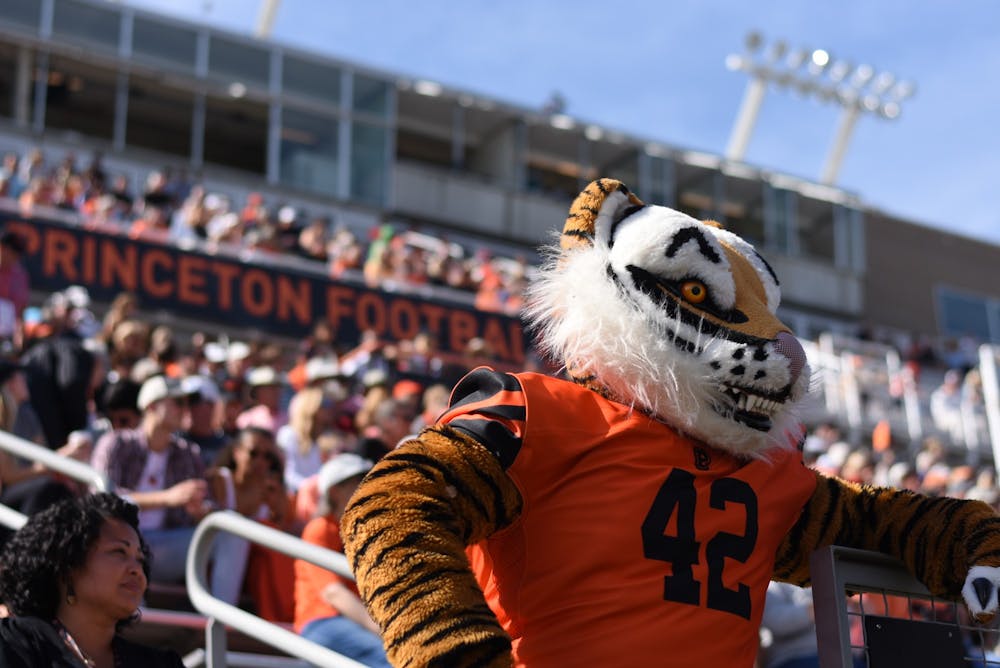This year’s March Madness tournament — in which the Princeton men's basketball team made it to the Sweet 16 and the Princeton women’s basketball team to the top 32 — proved to Princetonians that we are not bad at sports. In fact, we are pretty fantastic. Based on the crowds at regular home games, though, you wouldn't really know it.
I went to my first home football game during fall 2021, and I expected lots of excitement. What I found, however, was a half-full stadium empty of fanfare. It doesn’t need to be this way: sports can strengthen the bonds of a community, offering an opportunity for individuals to focus their joy on a unifying event. Yet we have to make them accessible, which can only happen when we put more energy into making games special parts of our school’s culture.
In 2021, we ended up winning the Ivy League football championship along with Dartmouth, but we only came together as a community for the large celebratory bonfire on Cannon Green after we beat both Harvard and Yale. Yet on a regular basis, celebrations occur in exclusive circles, such as eating clubs, student organizations, and private friend groups. Athletics offer a unique opportunity for energy and excitement that all students can equally participate in; the University should capitalize on this and provide more regular spirit-building activities that the entire campus can partake in together.
Imagine Baker Rink during the hockey season, filled with both students and community members decked out in orange and black. There is food, music, and maybe even a gear giveaway. The energy is palpable, not because everyone knows what constitutes a cross-check, but because this hockey game offers the chance for Princetonians of all stripes to celebrate, hang out, and have fun on a Friday night. Athletics comes with so much natural energy — anyone can be a fan by virtue of their identity as a University member and nothing else — and we should exert more energy to embody this ideal.
Even for the March Madness Sweet 16 game against Creighton, there were not nearly as many spirit-building activities as there should have been to celebrate such an enormous success. Life mostly went on as normal, as students followed their daily routines of grabbing quick dinners between library grind sessions. Though ODUS did organize a watch party at Whig, the hall was not necessarily conducive to community-building and insufficient to fit interested parties. Instead, the University could have organized a campus barbecue open to all, where students could have experienced in real time the great community that they were celebrating.
Rooting for Princeton basketball is not just about liking basketball: It’s about celebrating Princeton. There is a reason why athletics are at the center of campus life at so many universities: They are a way for the entire school to come together around shared experiences. Athletics build school pride and have the potential to bring students, alumni, and community members of all different interests and age groups together like no other.
I am not a diehard sports fan. Sporting events should have fun, spirit-building aspects to them that allow even those who are the least excited about sports to come and have a good time on a Sunday afternoon.
Athletics don’t have to be everything. We enjoy and celebrate our peers at dance and musical performances, theater shows, and poetry open mic nights. There is so much that makes our school special, from its incredible work ethic to its strong religious and cultural communities to its warm and creative atmosphere. We have formed our own special culture over the years. The way that the band parades around Firestone and students flock to their residential dining halls for a midnight meal on Dean's Date Eve is unique to Princeton and forms our identity.
Athletics presents just one more opportunity among many to build stronger school spirit and bring joy to the Princeton community. Let's take full advantage of it.
Julianna Lee is a sophomore and a Politics concentrator from Demarest, NJ. She can be reached by email at yl34@princeton.edu









